WPATH Member takes over at UK's speech therapy royal college
"LGBTQ+" and the Royal College of Speech and Language Therapists
My Inbox has been fuller than my stomach on Christmas Day.
A couple of weeks ago, I published my 4-Parter on Children and Adults with Communication Disabilities and the Discrimination they face when language demands are made of them; it starts here:
Since then, I have heard stories from speech therapists, teachers, nurses, carers, parents and some people who have had speech therapy themselves. And they have some significant concerns.
Has your child required speech therapy? Do you have a parent or grandparent who needed speech therapy after a stroke or a diagnosis of dementia?
Public and private healthcare is suffused with gender ideology all over the Western world and the UK is no exception. So it’s no surprise that Allied Health Professionals like Speech and Language Therapists have also been affected.
Speech therapists have told me they don’t dare say anything for fear of losing their jobs, their Health and Care Professions Council (HCPC) registration1 and their reputations. The HCPC is the therapists’ version of the doctors’ General Medical Council (GMC) or the nurses’ Nursing and Midwifery Council (NMC) so it means a lot to protect registration and be able to keep working in the profession and retain your livelihood. From the speech therapists I’ve spoken with, they love being speech therapists and can’t imagine doing anything else. Ironically, they help others speak but don’t feel they can speak up themselves; including to advocate for their patients and children.
They are concerned about how women, same-sex attracted people (LGB), those with conservative religious views and of course, disabled people are not having their voices heard.
They are worried about children being told people can change sex and encouraged to transition. They are losing access to single-sex spaces at work and so are their patients, and the children in schools. The language is muddled between sex and gender and the data is a mess.
They wouldn’t dream of being prejudiced against their patients, these are kind people, mostly women, but are scared they’ll be called ‘transphobes’ for wanting single sex wards, and not expecting patients with conditions such as developmental language disorder, autism, dementia or aphasia to follow preferred pronouns or gender neutral language.
They are incredibly uncomfortable with schools “socially transitioning” children and placing demands on even those with Special Educational Needs (SEN) to use the “right language”.
And one woman who contacted me, who is religious, tells me,
No-one seems to think there are women like me in the profession. I’m religious and my views are probably “conservative” (small ‘c’) and I don’t talk about my beliefs at work. I can’t. I’d be called a bigot. But I have to accept others’ beliefs? I thought religion and belief was protected too? But what sensible person wants to put their registration or job at risk?
They don’t see how the “LGBTQ+” message coming out of the Royal College of Speech and Language Therapists (RCSLT) considers the rights of others with protected characteristics in the Equality Act 2010 too.
The RCSLT describes its role on its homepage:
We support speech and language therapists by providing leadership, setting professional standards, facilitating research and promoting better education and training.
Speech therapists work across a number of settings, as the RCSLT state:
Mainstream and special schools
Courtrooms, prisons, young offenders’ institutions
Health – community health centres, hospital wards, outpatient departments
Children’s centres
Day centres
Clients’ homes
Independently or in private practice
And with vulnerable populations as fully listed here including babies, infants, older children, teenagers, young adults, adults and older adults. So that’s everyone aged 0 to 100+
Leadership of organisations such as RCSLT often set the tone, standards and direction of that organisation. The women (and some men) who have contacted me are concerned about that tone, standards and direction.
The Chair and where he sits
Pert is the new Chair of a profession that is 96% female, who calls himself queer and is a full member of WPATH and BAGIS. His Dr is for a PhD, not a medical degree. He is now the Chair of the RCSLT whose members treat children with special educational needs and adults with communication disabilities.
Speech and language therapists can be members of any organisation they wish outside of HCPC and RCSLT and usually join groups that help them with their continuous professional development or for peer support, to develop guidance in their area of specialism, support charities and so on.
The work he is involved in with WPATH and BAGIS appears long-standing. Therapists, teachers and parents are worried about the influence these organisations have and that the Chair is a member.
Why might they report being worried? Let’s take a look.
WPATH
World Professional Association for Transgender Health.
WPATH state on their website that:
The World Professional Association for Transgender Health (WPATH), formerly known as the (Harry Benjamin International Gender Dysphoria Association (HBIGDA), is a 501(c)(3) non-profit, interdisciplinary professional and educational organization devoted to transgender health.
and
WPATH has established internationally accepted Standards of Care (SOC) for the treatment of individuals with gender dysphoria.
In MacRichards’ article on WPATH, she reports
WPATH is not the typical professional organization that develops clinical practice guidelines. WPATH is a hybrid professional and activist organization, where activists have become voting members and have served as president. In fact, it can be argued that WPATH is activist-led rather than evidence-led.
Here are some examples of recent stories in relation to the work of WPATH.
Eunuchs
Last year, WPATH launched their Standards of Care 8 and introduced a new section: Eunuch Identity as reported by 4W.
WPATH state:
As with other gender diverse individuals, eunuchs may also seek castration to better align their bodies with their gender identity. As such, eunuch individuals are gender nonconforming individuals who have needs requiring medically necessary gender-affirming care.
Child sex abuse images uploaded to NHS website via WPATH doc
WPATH, as LBC and others reported, published a document with a direct link to a website which includes graphic and sexually explicit fictional descriptions of child eunuchs. When signing up to the website, called the Eunuch Archive, users are asked to select their interests from a menu of options that includes "forced castration" and "smooth look".
NHS Scotland had to apologise for uploading the document to an NHS website linking to a child castration and sexual abuse website. The error was a Category 1 event, (there aren’t any more serious than that), and the child abuse imagery lead to a referral to Police Scotland.
Genevieve Gluck of Reduxx covers the scandal in full here.
“Sex change surgery” for teenagers without parental consent
WPATH, as the Telegraph report, promotes sex change surgery for teenagers without parental consent:
WPATH guidelines encourage teenagers to use breast binders and practice “genital tucking” , despite risks to health.
Disaster
In October 2022, Genspect reported that the new Standards of Care are a “disaster”. They state:
In the original document WPATH offers “suggested minimum ages” for a number of irreversible surgical procedures for minors, such as:
14+ years old for cross-sex hormones
15+ years old for double mastectomies
16+ years old for breast implants, facial feminisation surgery
17+ years old for metoidioplasty, orchiectomy, vaginoplasty, hysterectomy, fronto-orbital remodelling
18+ years old for phalloplasty.
The decision to remove all age requirements (apart from the phalloplasty) was taken despite there being no new evidence to support that recommendation.
Further comment on the details of the Standards can be found here.
BAGIS
BAGIS stands for the British Association of Gender Identity Specialists.
On their homepage, they state:
The British Association of Gender Identity Specialists (BAGIS) was founded in 2014 for the purpose of promoting clinical research and the exchange of knowledge of gender dysphoria and transgender health. It is an association and network of healthcare professionals, from a wide range of disciplines, committed to promoting excellence in clinical practice, clinical research, training and education in the field of healthcare for trans and non-binary people. The Association encourages and fosters the highest standards of practice amongst its members, based upon the best available evidence, and advocates the adoption of similar standards amongst all health professionals in the British Isles.
and
The BAGIS is unreservedly opposed to the UK government’s decision to exclude trans people from a ban on conversion therapy and practices. The BAGIS also finds in the EHRC’s latest non-statutory guidance about how single sex exemptions in the Equality Act 2010 should be used, a core presumption to exclude rather than include, and which denigrates and dehumanises trans women. The BAGIS stands with trans and non-binary people in defence of their human rights, and is committed to condemning discrimination and transphobia in all its forms.
As Transgender Trend point out:
BAGIS was founded in 2014 to promote ‘clinical research and exchange of knowledge of gender dysphoria and transgender health’. The homepage is packed with reassuring references to ‘clinical research’, ‘clinical practice’, ‘excellence’ ‘best available evidence’ and ‘evidence based clinical practice.’ The problem, as evidenced by the 2019 BAGIS ‘Scientific Symposium’ at Durham, is that these claims are hard to substantiate.
RCSLT and “LGBTQ+”
On Twitter and in the RCSLT literature, Pert refers to himself as “The first openly queer (and first man) in the post” and states his pronouns as he/him. His website is here and trans voice work here. His Twitter is here.
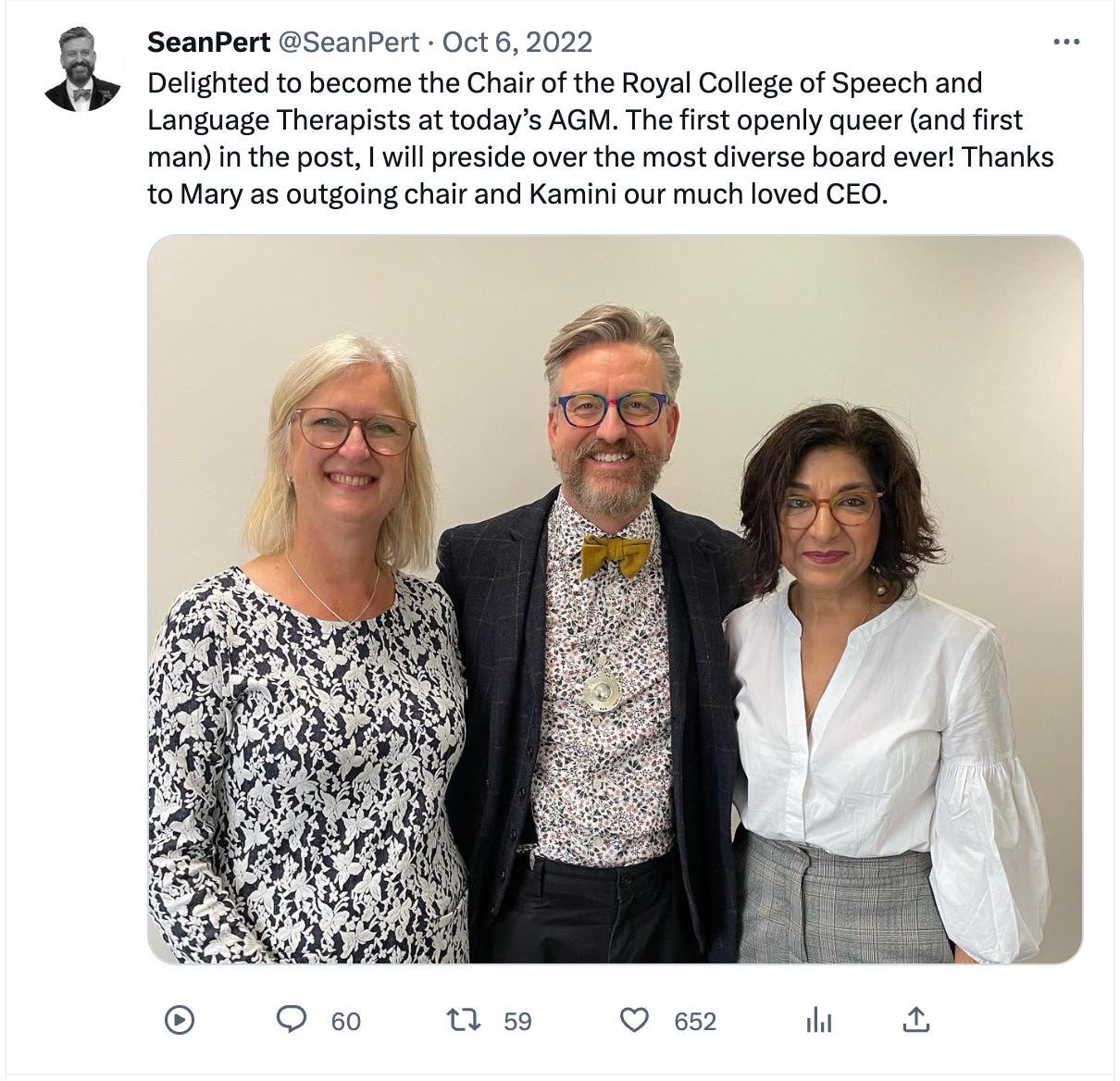
The RCSLT Chair’s responsibilities are set out here.
Pre-scientific belief
If Pert were a member of WPATH and BAGIS and that was that, those who have written to me tell me they may not be quite as worried. But the whole of the RCSLT and its Bulletin appears to be promoting an ideology that is a pre-scientific belief system. It’s one they say results in:
safeguarding concerns including
telling children that there are more than 2 sexes and inappropriate sexual material in school
safety of girls in mixed sex school toilets
children making medical decisions that are harmful and irreversible as recently evidenced in Hannah Barnes’ book Time to Think
The NHS’ Annex B and failure to provide same sex wards and care
How children and adults with communication disabilities are discriminated against with language confusion and demands such as preferred pronouns and gender neutral language, the precise opposite of what speech therapy is for
Celebrate 🏳️⚧️
The RCSLT website has been publishing articles on “LGBTQ+” for some time. You can see the publicly available archive here on their webpage Celebrating LGBTQ+ History Month.
Rewriting history
On the RCSLT’s What does Pride mean? webpage, they report:
The first Pride in the UK took place in London in 1972 at a time in which LGBTQIA+ people could be prosecuted for homosexuality as it was seen as an illness. The UK protests were sparked by the 1969 Stonewall riots in New York, which came as a culmination of police raids on LGBTQIA+ spaces.
At the forefront of the Stonewall riots and the fight against prejudice in New York were transgender women such as Martha P Johnson, Sylvia Rivera and Miss Major Griffin-Gracy. Trans and non-binary people and people of colour are a major part of the reason why pride exists, yet they are often most discriminated against within the community.
Many would argue that that’s not entirely accurate. Here’s Fred Sergeant in his own words:
Focus on diversity
Pert wrote an article in the “Focus on Diversity” section of the RCSLT Bulletin2, the profession’s journal. Here are some extracts. And you can read the full article here.
I asked for the full references list from this article. I was interested to read the evidence base. (Ask me if you want a copy). It lists 2 Guardian articles, 2 Stonewall documents, 1 LGBT Foundation Guide, another story from RCSLT Bulletin, 1 Government publication and a reference to the Equality Act 2010, and 1 TUC report and a Jessica Kingsley published book.
I also noted Pert references sexual orientation and gender reassignment in relation to the Equality Act 2010 but “sex” doesn’t get a mention.
A Bulletin section called In Pictures highlights social media posts in the same edition of the Bulletin with the caption In celebration of LGBTQ+ history month, SLTs and SLTAs used social media to increase the visibility of the LGBTQ+ community within speech and language therapy.
It might be my old eyes but are there any signs that say “lesbian” (96% female profession) or “gay”, why only “LGBTQ+”?
A student wrote a letter for the next Bulletin in response to Sean’s article. The student states:
On a student placement, I met a colleague who identifies as non-binary and uses they/them pronouns. When a senior SLT misgendered them, it felt difficult for me to say something. It can feel like you only have a moment to point out incorrect pronoun use and I missed this opportunity. hugely regret not advocating for my colleague and for several weeks I berated myself for my silence.
There are still many issues that the LGBTO+ community have to face. Respecting someone's right to identify and be recognised as their authentic self is at the core of LGBTQ+ allyship.
Given our profession champions advocating for people who struggle to be heard in society, it is our responsibility as clinicians to educate ourselves and stand with our LGBTQ+ colleagues and service users.
The RCSLT values upholding dignity and respect, displaying leadership, and challenging situations we disagree with. This can feel uncomfortable as a student and at odds with our position in the clinical hierarchy, but I believe it is as much our responsibility as any other member of staff.
If I am lucky enough to have another opportunity to advocate for a colleague, I will not make the same mistake again.
It’s tough being a student. There’s always a lot to learn and it’s a very pressured environment on placements. I’d point this student towards my piece on communication disabilities and discrimination. Would he or she correct a patient with dementia or aphasia on pronouns? What about disabled people’s rights under the Equality Act 2010?
In a Bulletin article entitled Pride in the Profession, one speech therapist writes:
It was a few years into working as an SLT3 that I finally embraced my queer identity. This has since developed into chairing a lesbian, gay, bisexual, transgender, queer, intersex,and asexual (LGBTQIA+) staff network for my trust, helping to set up and run the UK SLT Pride Network - the first LGBTQIA+ staff network for LGBTQIA+ SLTs advocating strongly for diversity in my workplace.
And
I would not be the therapist I am without my queerness. I wouldn’t be the LGBTQIA+ advocate I am either without my experience as an SLT.
And
I am queer. I am also an SLT […] At times I may be in full SLT mode, but always from the perspective of my lived queer experience. And, when I am in queer spaces, I do not leave my SLT mind behind.
I encourage you to celebrate your diversity. […] Bring your whole self to work.
Where to turn?
If you are concerned about how your child or adult relative is affected, or you’re a concerned health or social care worker or teacher, or a patient yourself, you can take a look at the resources, advice and actions of:
Also, in reply to the upcoming WPATH conference, Genspect are running an event called The Bigger Picture, 27th– 29th April, Killarney, Ireland and Online:
Genspect intends this to be the first of a series of counter-conferences to EPATH/WPATH, as they continue to confront EPATH, an organisation that brooks no debate and incorrectly insists that the “science is settled.” This is why “The Bigger Picture” conference is taking place in Killarney; the EPATH/WPATH conference will be happening just down the road.
Tickets available here.
Let me know of any others I can recommend in future.
Also, you can contact the Royal College of Speech and Language Therapists with any enquiries you might have via their website here.
In the next post, we’ll be looking at how this all intersects with the transgender voice work that speech and language therapists have been providing on the NHS for decades.
By the way, you might find this an interesting piece on HCP Tribunal Service’s regulatory overreach by Sarah Phillimore here.
The Bulletin magazine states, “The views expressed in Bulletin are not necessarily the views of the RCSLT. Publication does not imply endorsement.” It is sent to every RCSLT member unless they opt out. There are around 20,000 members and 18,390 HCPC registered practicing speech and language therapists in the UK.
“SLT” is an abbreviation for Speech and Language Therapist
I was surprised to learn that speech therapists work in the justice system, which is great news.





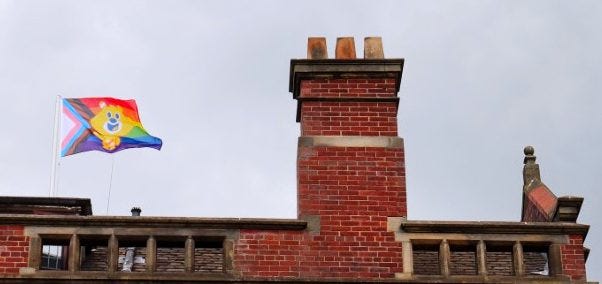

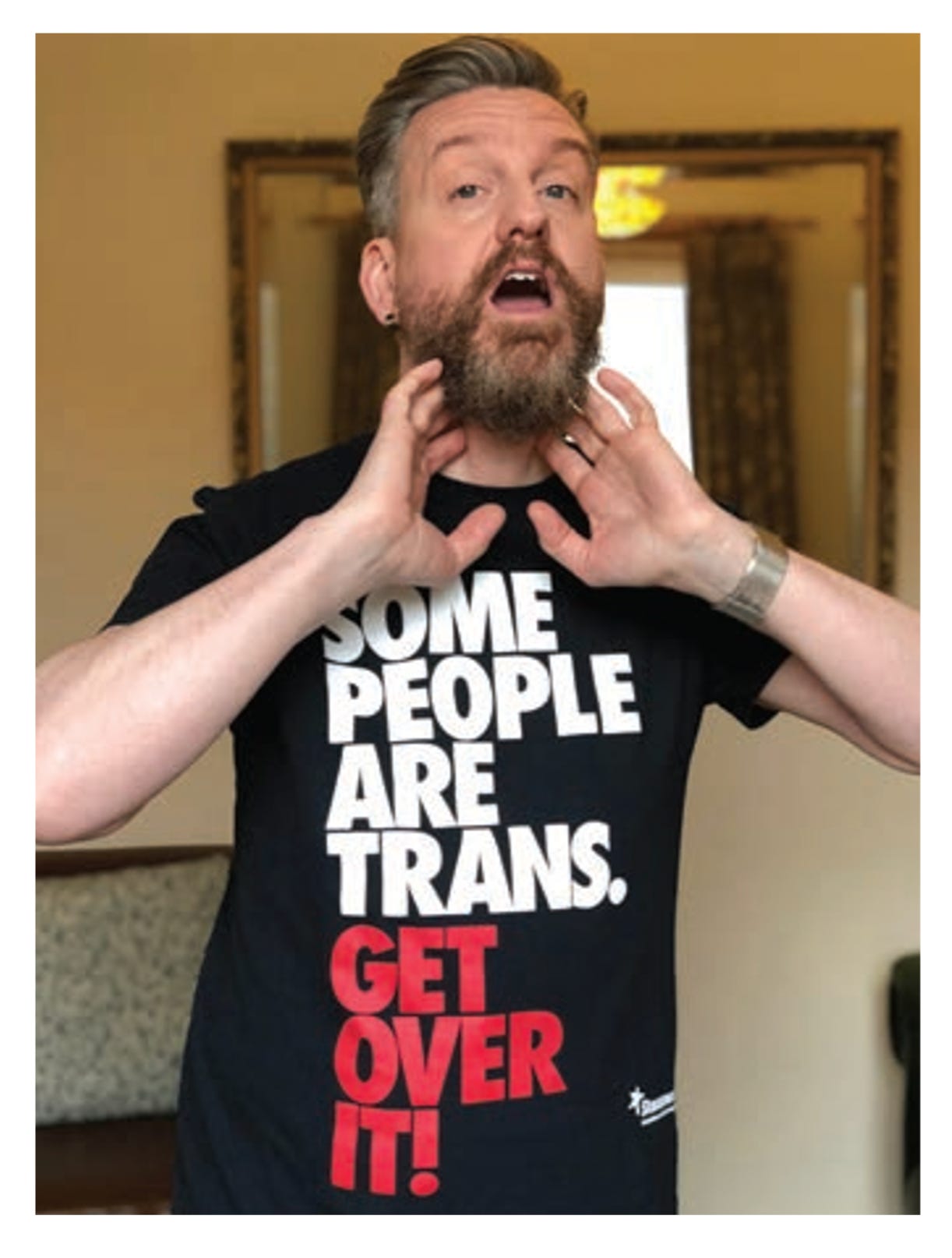
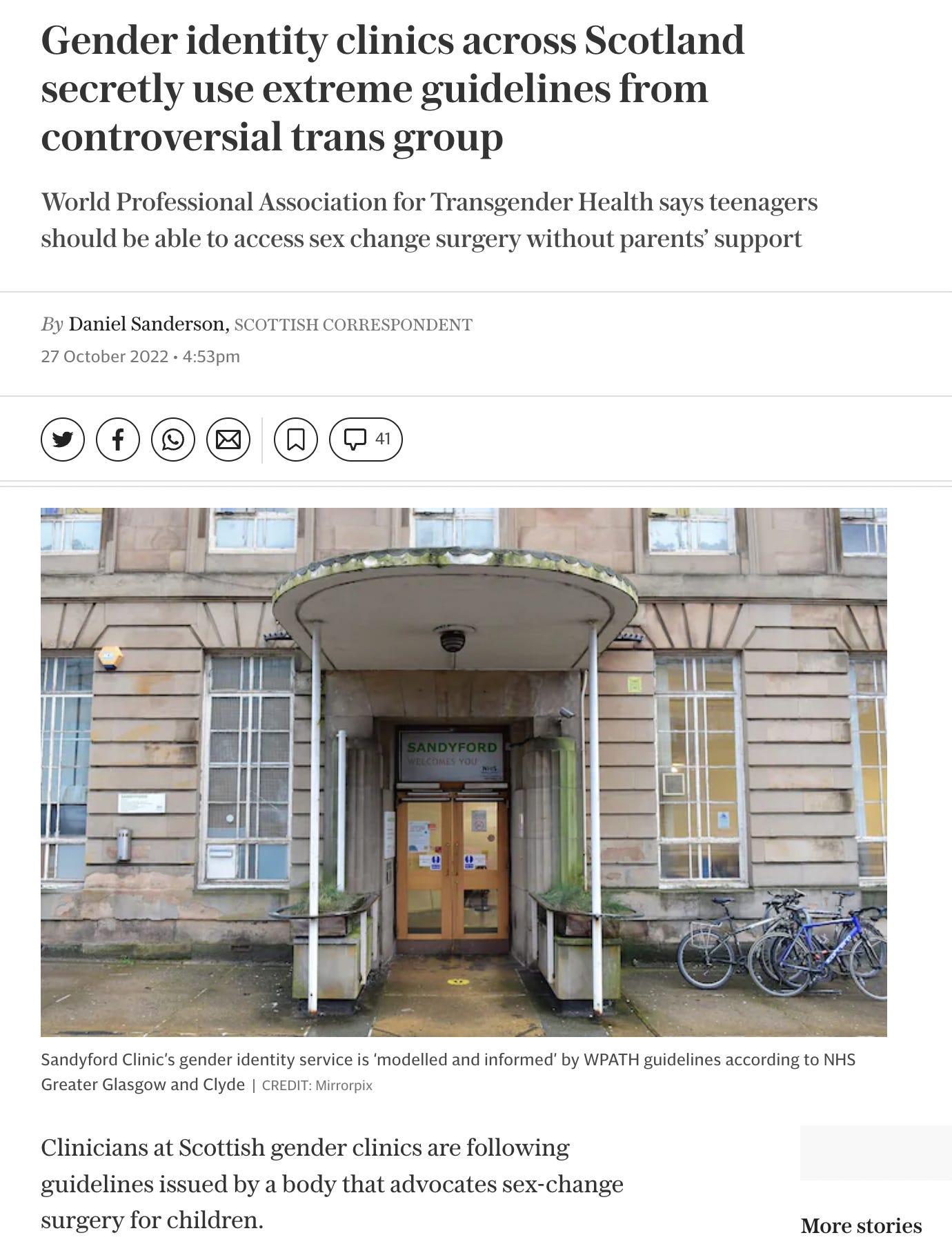
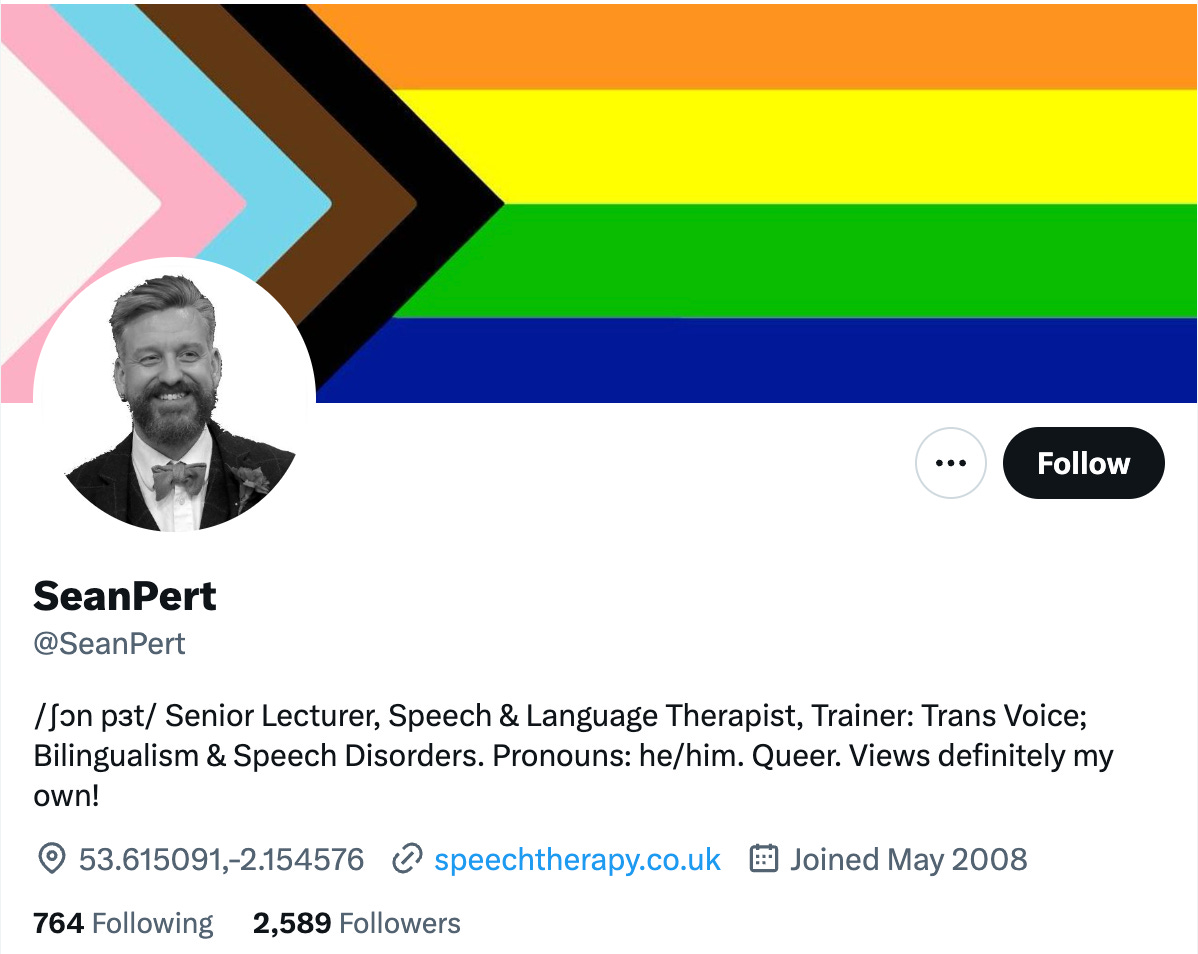

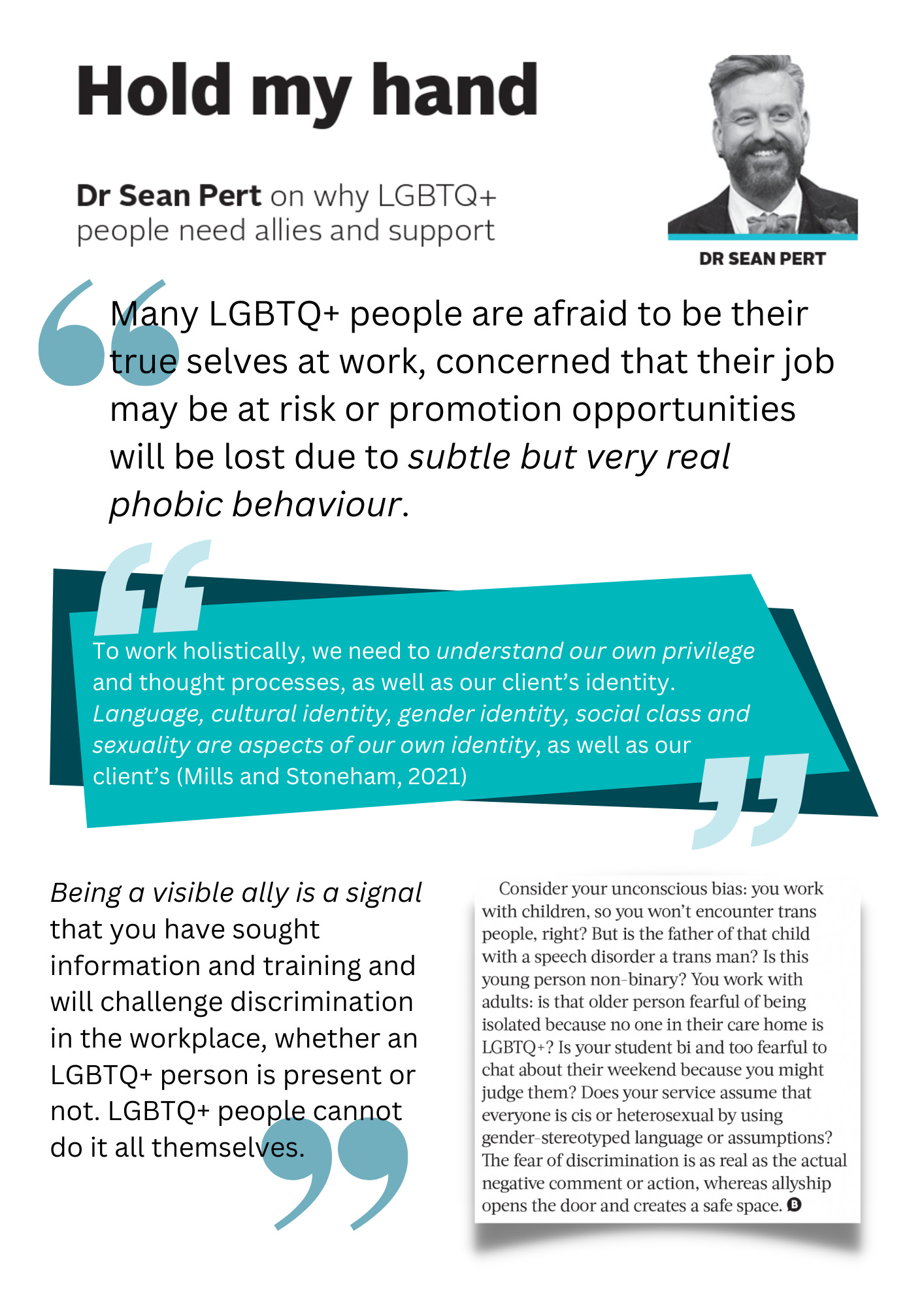
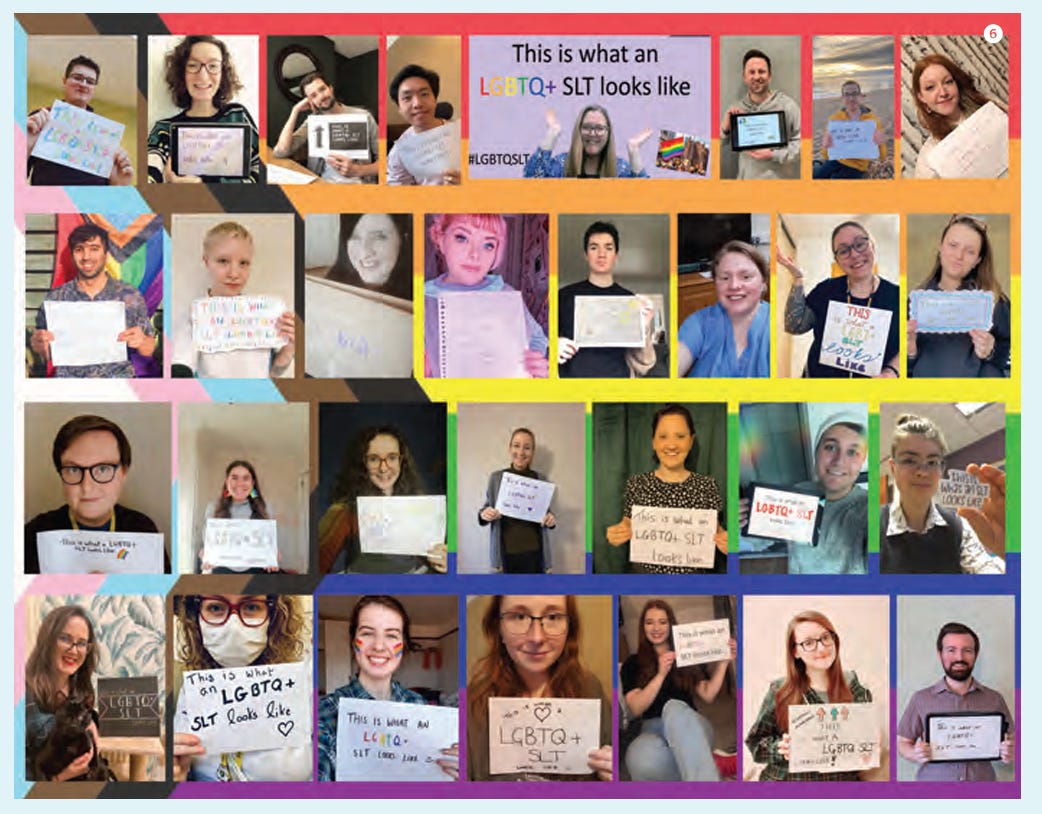
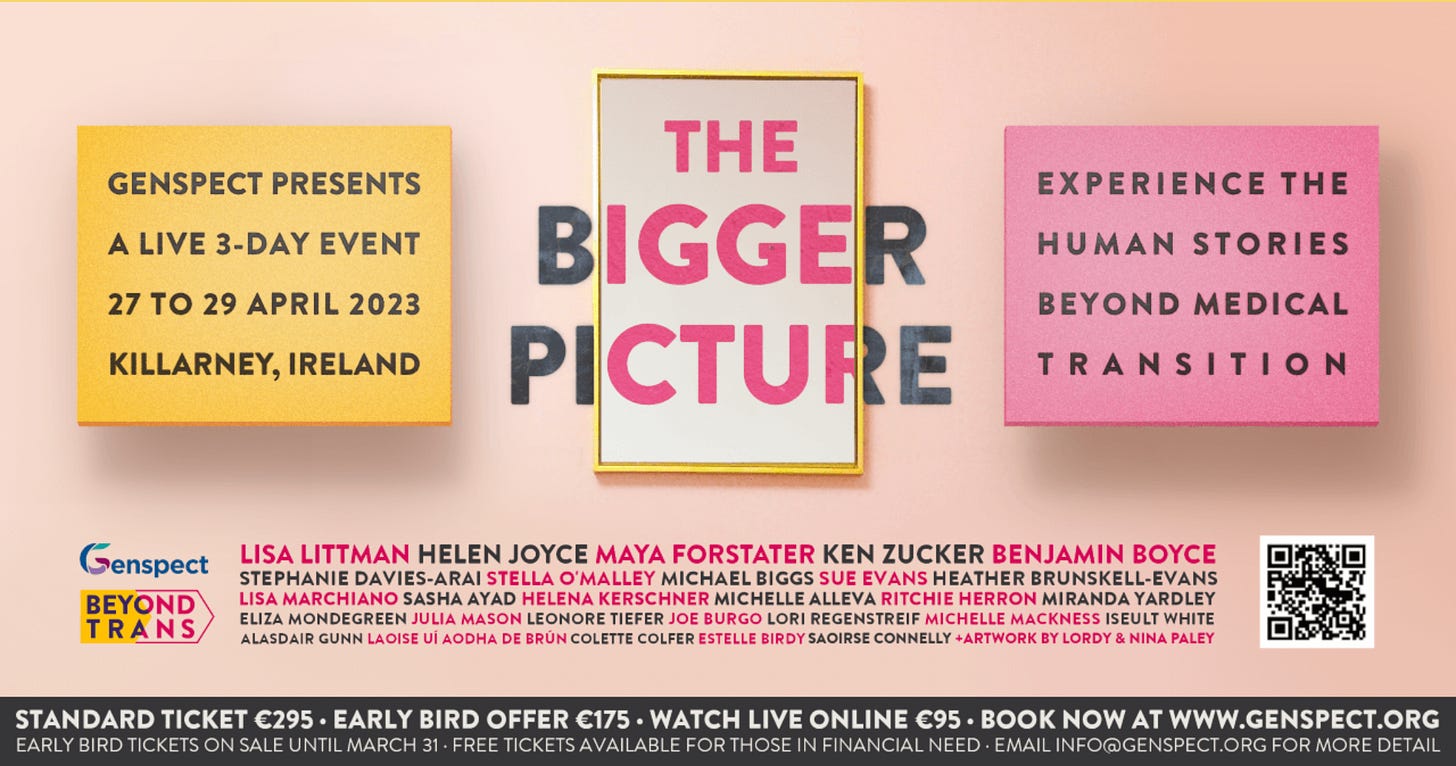
It has been obvious that something has been going badly wrong with RCSLT since 2020. Not just from the evidence of self-flagellation in 2020 as part of BLM-derangement syndrome that swept the globe in the midst of the Covid-19 pandemic, then committing to EDI as the guiding force of the organisation, and on top of that the insidious influence of gender identity ideology.
"Inclusion" might be the current watchword but "engagement" and "accountability" have gone right down the pan.
At the 2022 AGM the outgoing Chair, Mary Heritage, said:
"Right back at the start of my term in early 2021 we held a mirror up to the RCSLT Board – in the form of a report from Kiki Maurey. She told us uncomfortable truths. The Board of RCSLT appears to its members as elitist, exclusive, old fashioned (fusty dusty, I think she said). Surely not us? Well yes, an uncomfortable message from our members. No wonder the Board membership had remained white and female and ‘mature’ for so long.
We acted fast – a 5-year vision, changes to the Memorandum and Articles, a new process of nomination and selections to replace elections, promoting diversity, a new Vision and a set of core Values that we hold one another to account for."
Worth mentioning that to produce her report Kiki Maurey interviewed only 19 RCSLT members, of whom only four were not Trustees or staff members. One of the interviewees is quoted as recommending that the then Board should be "less stuffy, dusty and remote". It is not mentioned whether this interviewee was a Board Member (Trustee), a member of staff or an "ordinary member".
https://www.rcslt.org/wp-content/uploads/2022/05/RCSLT-Board-Report-March-2021-Kiki-Maurey.pdf
So how has that "accountability" worked out? How enthusiastically did members embrace the opportunity to change things? How has the profile "at the top" changed?
RCSLT (96% female membership) has swapped CEO Kamini (ticks diversity box and is an SLT) and Chair Mary for CEO Steve (mature, white, male nurse) and Chair Sean (mature, white, male, queer).
Forgive me if I am less than impressed by this start at ensuring that the leadership of RCSLT is not only decidedly unrepresentative of the membership but that I am also expected to celebrate the replacement of mature females, "stuffy, dusty and remote" by nature apparently, with - what? Mature white males? Presumably "fresh, sparkling and approachable"? Really?
Including "queer" Sean, wearing his T-Shirt representing an organisation whose CEO has described lesbians as "sexual racists" and which demonises the vast majority of the population who recognise the reality of biological sex?
How are members responding to this more "approachable" Board?
The November 2021 AGM (Zoom) tabled a series resolutions proposing to dramatically alter the governance of RCSLT, as recommended by Kiki Maurey.
https://www.rcslt.org/wp-content/uploads/2021/09/RCSLT-AGM-draft-minutes-Nov2021-amended-220322.pdf
For example, to replace the democracy of elected representation with a Board comprised of appointees. These would be selected by a panel (The Nomination Committee?) whose membership would be appointed by Board, with the Board Chair also being the Chair of the Nomination Committee.
Despite this, the 2021 AGM was attended by a grand total of 36 "ordinary members" with voting rights. (Another 16 voting members were either Trustees or members of RCSLT staff.) This was down from 313 "ordinary members" with voting rights at the 2017 AGM in Glasgow.
In the figures below, "other RCSLT members with voting rights" means ordinary members with voting rights who were neither Trustees nor staff who were also RCSLT members:
2017 - Glasgow
313 other RCSLT members with voting rights attended
2018 - Cardiff
97 other RCSLT members with voting rights attended
2019 - Nottingham
230 other RCSLT members with voting rights attended
2020 - Zoom
70 other RCSLT members with voting rights attended
2021 - Zoom
36 other RCSLT members with voting rights attended
2022 - Zoom
20 other RCSLT members with voting rights attended
(Another 22 voting members were either Trustees or members of RCSLT staff)
So by the 2022 AGM the number of Trustees and Staff with voting rights outnumbered the "ordinary members" attending.
RCSLT 96% female membership has mutated from a democratic organisation run by its elected members into an organisation run by appointees with The Chair, a middle-aged white man, overseeing and gatekeeping. Alongside the new middle-aged white male CEO.
https://www.rcslt.org/wp-content/uploads/2022/03/Nominations-Committee-Terms-of-reference-4-Mar-2022.pdf
Thanks for nothing, Kiki.
With that in mind, and everything in this article indicating that members are both unhappy with the current situation and cowed into submission by an oppressive culture, fear of censure by RCSLT and sanctions by HCPC, it is worth emphasising that membership of RCSLT is entirely voluntary.
The article states:
"Speech and language therapists can be members of any organisation they wish outside of HCPC and RCSLT"
The last two words should be omitted as the only requirement to practice is membership of HCPC.
As also mentioned, SLTs "usually join groups that help them with their continuous professional development or for peer support, to develop guidance in their area of specialism"
Non-members can subscribe to RCSLT Bulletin, SLT Services can subscribe to or may have access to Research Journals via employing organisations or local University Depts.
It is perfectly possible to keep up to date and fulfil the CPD requirements of HCPC registration without being a member of RCSLT.
Professional indemnity insurance can be bought from other agents.
"The majority of RCSLT’s income is generated through membership fees, which account for 82% of total income"
2022 AGM minutes
Just for comparison, the 2017 AGM minutes (attended by 313 ordinary members in Glasgow) and the 2022 AGM minutes (attended by 20 ordinary members on Zoom):
2017 AGM - Glasgow - 313 members
https://www.rcslt.org/wp-content/uploads/media/Project/Governance-documents/agm-minutes-2017.pdf
2022 AGM - Zoom - 20 members
https://www.rcslt.org/wp-content/uploads/2022/12/AGM-OCT-2022_Minutes-for-acceptance-at-2023-AGM_DRAFT.pdf
I hope RCSLT members subscribe to your Substack, Preston.
The remark from the religious woman is so troubling. The idea that small c conservatives are bigots is everywhere. People are too frightened to state views that were totally mainstream - or at least, not particularly controversial - only a few years ago. This is not what a liberal democracy looks like.